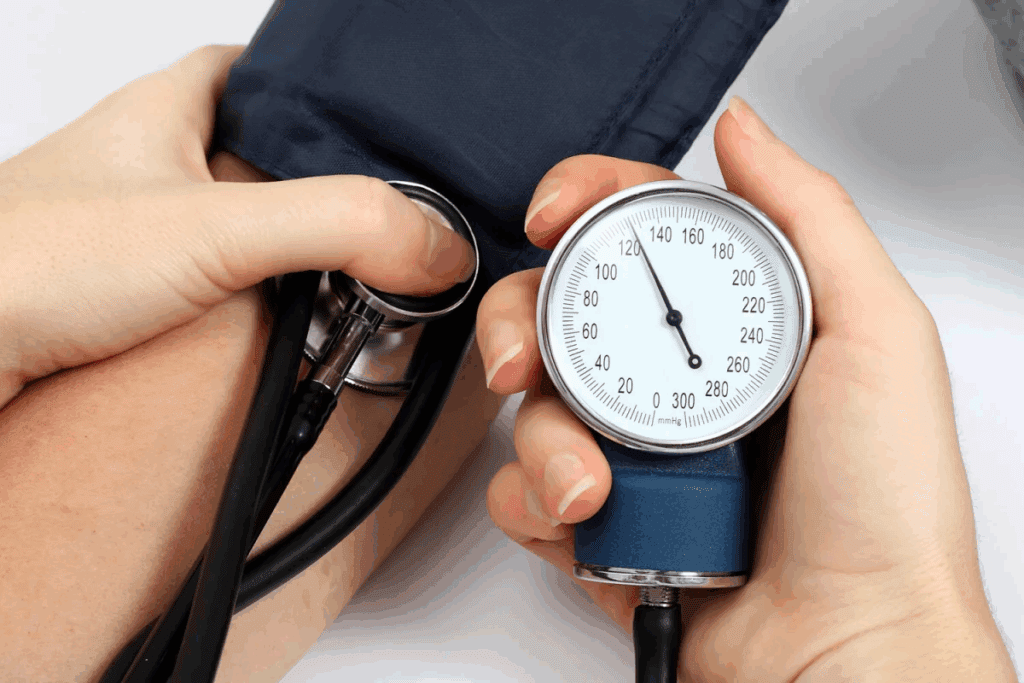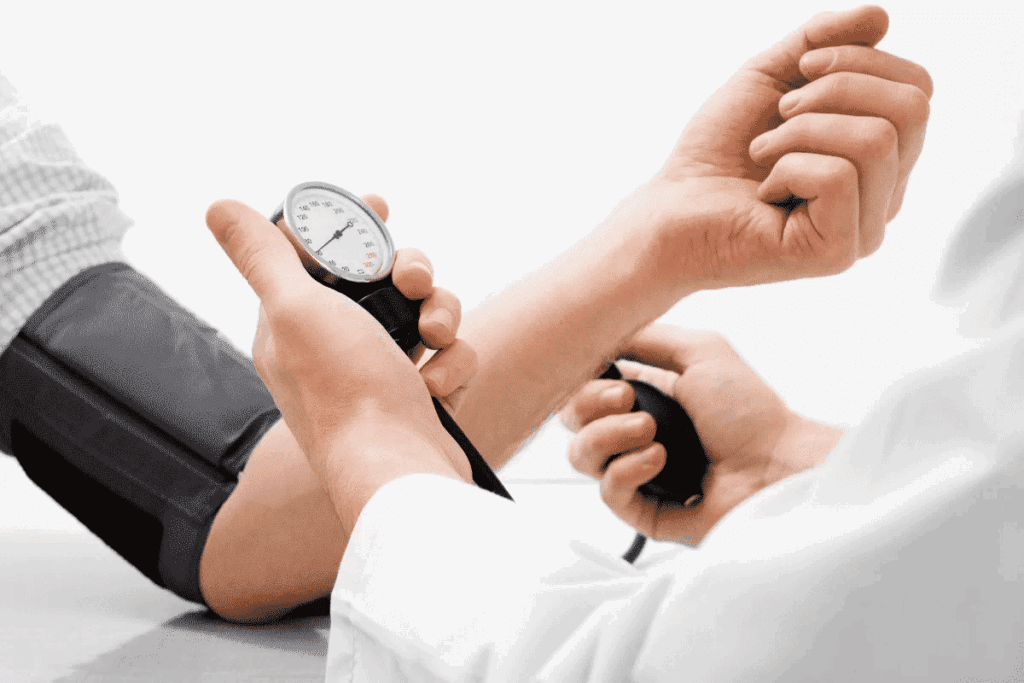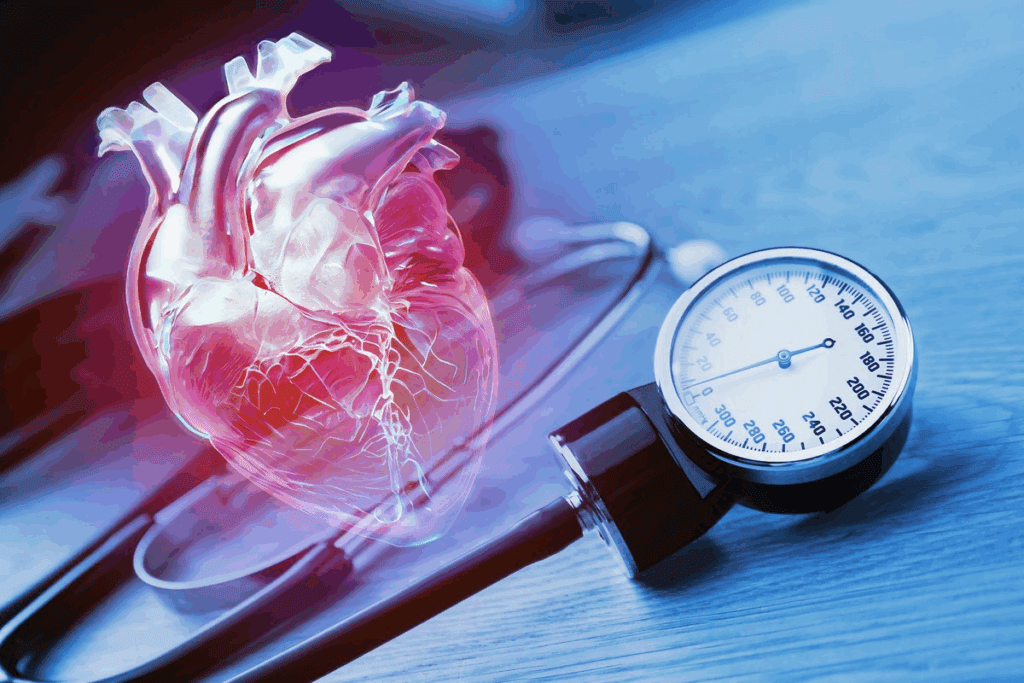
High blood pressure is a big worry for young adults. Recent data shows 23.4% of adults aged 18-39 have it. We want to help you understand the risks and take care of your heart health early.
Discover what causes high blood pressure in young adults and how to prevent it.
Knowing what causes high blood pressure is key for catching it early and managing it. At Liv Hospital, we focus on patient care and help young adults make smart health choices.
By finding out the key factors that increase blood pressure, young adults can act early. This can help prevent serious heart problems later on.

High blood pressure is becoming more common in people in their 20s and 30s. It’s a condition where blood pressure is too high, which can lead to serious health problems if not treated.
Young adults are seeing more cases of high blood pressure. This is due to lifestyle choices, diet, and genetics. Knowing these causes is key to preventing and catching it early.
Recent health data shows more young adults are getting high blood pressure. It’s important to stay aware and take steps to prevent it. Regular health checks and a healthy lifestyle can help manage blood pressure.
Blood pressure is checked with a device called a sphygmomanometer. It gives two important numbers: systolic and diastolic. Systolic is the pressure during heartbeats, and diastolic is between beats. Knowing these numbers helps doctors diagnose hypertension.
Blood pressure readings are divided into stages. For example, 120/80 mmHg is normal. Higher numbers might mean prehypertension or hypertension. Doctors use readings from two visits to diagnose hypertension.
High blood pressure can have serious effects. Short-term symptoms include fatigue and dizziness. Long-term risks include heart disease, stroke, and kidney damage. It’s important to manage blood pressure to avoid these problems.
Getting high blood pressure checked early and treated can lower the risk of these serious conditions. By understanding what causes high blood pressure and living a healthy lifestyle, young adults can reduce their risk.

It’s important to know what causes high blood pressure in young adults. This knowledge helps in preventing and managing the condition. High blood pressure, or hypertension, can affect anyone, including young people.
Hypertension in young adults can be either primary or secondary. Primary hypertension has no clear cause and is linked to genetics, lifestyle, and environment. Secondary hypertension is caused by a medical condition, like kidney disease or hormonal issues.
Knowing the difference between primary and secondary hypertension is key. Primary hypertension is more common and often linked to lifestyle. Secondary hypertension is caused by a health problem.
| Characteristics | Primary Hypertension | Secondary Hypertension |
| Cause | No identifiable cause, often linked to genetics and lifestyle | Caused by an underlying medical condition |
| Common Factors | Obesity, high sodium intake, stress | Kidney disease, hormonal disorders, certain medications |
| Treatment Approach | Lifestyle modifications, possibly medication | Treating the underlying condition, possibly medication |
Young adults face special challenges that can lead to high blood pressure. Lifestyle factors like diet, exercise, and stress play a big role. They may also be more likely to engage in risky behaviors, such as drinking too much or smoking.
Finding high blood pressure early is critical to avoid serious heart problems. Regular health checks can catch hypertension early. This allows for quick action to prevent heart disease, stroke, and kidney disease.
By understanding the causes of high blood pressure, young adults can take steps to keep their hearts healthy. This reduces the risk of serious health issues.
Diet and weight play big roles in high blood pressure in young adults. What we eat and our weight can really affect our blood pressure.
Being overweight is a big risk for high blood pressure. It makes the heart work harder, raising blood pressure. The CDC says obesity is linked to many health problems, including high blood pressure. Keeping a healthy weight is key for heart health.
“Obesity is a big health issue worldwide, and it’s linked to high blood pressure,” a health report says. We need to tackle obesity with diet, exercise, and lifestyle changes.
Too much salt can also raise blood pressure. Salt makes the body hold more water, increasing blood vessel pressure. The American Heart Association suggests eating no more than 2,300 milligrams of sodium daily. Lowering sodium can help control blood pressure.
Some people are more sensitive to salt, which affects their blood pressure more. Knowing about salt sensitivity can help manage high blood pressure better.
A diet lacking nutrients and full of processed foods can lead to high blood pressure. Processed foods have lots of sodium, unhealthy fats, and sugars. Eating a balanced diet with fruits, veggies, whole grains, and lean proteins is important for blood pressure.
Young adults can lower their risk of high blood pressure by making smart food choices and staying at a healthy weight. It’s about making lasting lifestyle changes for better health.
Our daily lives, including how active we are and how well we sleep, greatly affect our blood pressure. Being active regularly helps keep blood pressure healthy. On the other hand, a sedentary lifestyle can raise the risk of high blood pressure.
A lifestyle with little or no physical activity is a big risk for high blood pressure. Sitting for long periods can cause health problems like obesity and heart disease. Regular exercise, like walking or cycling, can help avoid these issues.
Benefits of Regular Exercise:
Poor sleep quality and irregular sleep patterns can also impact blood pressure. Studies show that not enough sleep can raise stress hormones, which can increase blood pressure. It’s important to have a regular sleep schedule and a sleep-friendly environment.
Tips for Better Sleep:
Poor work-life balance and stressful lifestyles can also raise blood pressure. Chronic stress at work or home can keep blood pressure high. Using time management and stress reduction techniques, like meditation, can help manage stress and improve health.
Strategies for Achieving Work-Life Balance:
Substance use can harm young adults’ heart health. It’s important to know how it affects blood pressure. This knowledge helps prevent and manage these risks.
Drinking too much alcohol can raise blood pressure. Regularly drinking too much can lead to high blood pressure. The American Heart Association suggests drinking less to avoid high blood pressure.
Here are some alcohol use tips:
Smoking and using nicotine products are big risks for heart disease and high blood pressure. Nicotine narrows blood vessels, raising blood pressure. Quitting smoking is key to managing blood pressure.
Smoking and nicotine risks include:
Illegal drugs and stimulants, like amphetamines, greatly affect blood pressure. They can cause blood pressure and heart rate to spike, posing serious heart risks. It’s best to avoid these substances to prevent harm.
In summary, substance use is a big risk for blood pressure in young adults. Staying away from too much alcohol, smoking, and illegal drugs is vital for keeping blood pressure healthy.
Some prescription and over-the-counter drugs can really affect blood pressure. These drugs help with many health issues but can also raise blood pressure. It’s key to know how they might impact your blood pressure.
Birth control pills and hormonal contraceptives might raise blood pressure in some women. The estrogen in these pills can make blood vessels narrower, increasing blood pressure. Women on hormonal contraceptives should keep an eye on their blood pressure and talk to their doctor about it.
NSAIDs, like ibuprofen and naproxen, can also affect blood pressure. They can make the kidneys hold onto more sodium and water, which can raise blood pressure. It’s important to use NSAIDs carefully and only as directed by a doctor, even more so for people with high blood pressure.
| Medication Type | Potential Effect on Blood Pressure | Precautions |
| Birth Control Pills | May increase blood pressure due to estrogen | Monitor blood pressure regularly |
| NSAIDs | Can cause sodium and water retention | Use judiciously, consult healthcare provider |
| Decongestants | Can cause blood vessels to constrict | Avoid prolonged use, consider alternatives |
Decongestants in cold and allergy meds can make blood vessels narrower, raising blood pressure. Other drugs, like some antidepressants and steroids, can have similar effects. It’s vital to read medication labels carefully and consult with a healthcare provider about possible interactions and side effects.
Knowing how different medications can affect blood pressure is key for heart health. By understanding these effects and talking to doctors, people can manage their blood pressure better. This helps lower the risk of heart problems.
Stress and mental health play big roles in high blood pressure among young adults. Chronic stress can deeply affect our health, changing how we act and our body’s responses. This can raise our blood pressure.
Chronic stress turns on the body’s “fight or flight” system. This makes our heart beat faster and blood pressure go up. But, if stress lasts too long, it can keep blood pressure high. We’ll look at how stress affects us and how to handle it.
Physiological Effects of Chronic Stress:
| Effect | Description |
| Increased Heart Rate | The body’s “fight or flight” response causes the heart to beat faster. |
| Vascular Constriction | Blood vessels constrict, increasing blood pressure. |
| Hormonal Changes | Stress hormones like cortisol and adrenaline are released, affecting blood pressure regulation. |
Anxiety disorders are common among young adults and can lead to high blood pressure. The connection between mental and heart health is complex. It involves direct effects on the body and indirect effects through behavior.
Sleep apnea makes breathing stop and start during sleep, causing poor sleep quality. It’s a big risk for high blood pressure. It leads to low oxygen levels and frequent wake-ups, straining the heart.
Improving sleep quality can help manage blood pressure. We’ll talk about ways to tackle sleep apnea and improve sleep hygiene.
Medical conditions can cause high blood pressure in young adults. Some health issues directly or indirectly affect blood pressure. It’s important to manage these conditions well.
Kidney disease is a risk factor for high blood pressure. The kidneys help control blood pressure by managing fluid and electrolyte levels. If kidney function is poor, blood pressure can rise.
Chronic kidney disease or renal failure can lead to hypertension. Managing kidney disease with medication, lifestyle changes, and sometimes dialysis or transplant is key to controlling blood pressure.
Diabetes can also cause high blood pressure. Insulin resistance, often seen in type 2 diabetes, can increase blood pressure. Diabetes and high blood pressure are linked through insulin resistance, vascular issues, and kidney damage.
Managing diabetes with diet, exercise, and medication can lower the risk of high blood pressure.
Hormonal disorders can affect blood pressure. Hyperthyroidism, for example, can raise heart rate and blood pressure. Other hormonal imbalances, like Cushing’s syndrome and pheochromocytoma, can also cause hypertension.
It’s important to diagnose and treat hormonal disorders to manage blood pressure. Treatment may include medication, surgery, or other interventions to correct hormonal imbalances.
Some heart problems can lead to high blood pressure. For example, coarctation of the aorta can increase blood pressure. Heart valve disorders can also affect blood pressure regulation.
| Medical Condition | Impact on Blood Pressure | Management Strategies |
| Kidney Disease | Impaired renal function leads to fluid retention and increased blood pressure. | Medication, lifestyle changes, dialysis, or transplantation. |
| Diabetes | Insulin resistance and vascular dysfunction contribute to hypertension. | Lifestyle modifications, medication. |
| Hormonal Disorders | Hormonal imbalances affect heart rate and blood pressure. | Medication, surgery, or other interventions to correct hormonal imbalances. |
| Cardiovascular Abnormalities | Structural heart defects increase blood pressure. | Surgical correction, medication to manage symptoms. |
Understanding and managing medical conditions is key to preventing and controlling high blood pressure in young adults. By addressing these conditions, individuals can lower their risk of hypertension and its complications.
It’s important to know about genetic and biological factors that can lead to high blood pressure. Some genes can make you more likely to get high blood pressure. Knowing this helps us take steps to prevent it.
Having a family history of high blood pressure is a big risk factor. Research shows that people with a family history are more likely to get high blood pressure. This is because genes can affect how the body handles blood pressure.
Table: Risk Factors Associated with Family History of Hypertension
| Risk Factor | Description | Impact on Blood Pressure |
| Genetic Predisposition | Inherited traits that affect blood pressure regulation | Increased risk of developing hypertension |
| Family History | Presence of hypertension in first-degree relatives | Higher likelihood of developing hypertension |
| Lifestyle Factors | Diet, exercise, and other lifestyle choices influenced by family habits | Can contribute to or mitigate hypertension risk |
Women face unique factors that can affect their blood pressure. Hormonal changes during the menstrual cycle, pregnancy, and menopause can impact blood pressure. For example, women who had high blood pressure during pregnancy are at higher risk of chronic hypertension later.
“Hypertension in pregnancy is a significant predictor of future cardiovascular risk in women.” – American Heart Association
Some people naturally have higher blood pressure due to genetics or biology. These variations can be influenced by ethnicity, age, and genetics. Knowing these variations helps in accurate diagnosis and treatment.
When looking at the risk of high blood pressure in young adults, we must consider these genetic and biological factors. Understanding these can help us give personalized advice and treatment plans to reduce their impact.
It’s important to know what causes high blood pressure in young adults. This knowledge helps in preventing and managing it. Factors like diet, lifestyle, and health conditions play a big role in blood pressure.
Research shows that keeping an eye on blood pressure can stop heart disease. We need to know what raises blood pressure and act early to lower these risks.
Keeping a healthy diet, exercising regularly, managing stress, and checking blood pressure often can help. It’s key to understand what affects blood pressure and take steps to keep our hearts healthy.
Being proactive about our health means making smart lifestyle choices. Working with doctors to handle health issues is also vital. This way, we can keep our blood pressure in check and avoid heart disease.
High blood pressure in young adults can come from many sources. Diet and weight play a big role. So does physical activity and lifestyle choices. Substance use, certain meds, and stress also matter.
Underlying medical conditions and genetics can also affect blood pressure.
Obesity is a big risk for high blood pressure in young adults. Extra weight can cause insulin resistance and inflammation. These can raise blood pressure.
Yes, some meds like birth control pills and NSAIDs can raise blood pressure. It’s important to know this and talk to a doctor.
Stress can really affect blood pressure. It can make it go up. To keep blood pressure down, manage stress with relaxation, exercise, and a good work-life balance.
Yes, conditions like kidney disease and diabetes can raise blood pressure. It’s key to manage these conditions to avoid hypertension.
A family history of hypertension can up your risk. Knowing this can help you take steps to prevent it.
Yes, healthy choices can help manage blood pressure. Eat well, stay active, manage stress, and avoid substance use.
High sodium and poor nutrition can raise blood pressure. Eating more fruits, veggies, and whole grains can help.
Exercise can lower blood pressure and reduce hypertension risk. But being sedentary can raise it.
Yes, some people naturally have higher blood pressure. Working with a doctor to manage it can prevent heart damage.
Drinking too much and smoking can greatly increase blood pressure and heart disease risk. It’s important to avoid or limit these behaviors.
World Health Organization. (2025). 13 Factors That Can Cause High Blood Pressure. Retrieved from https://www.who.int/news-room/fact-sheets/detail/hypertension
Subscribe to our e-newsletter to stay informed about the latest innovations in the world of health and exclusive offers!
WhatsApp us